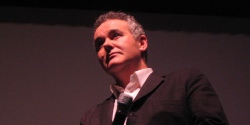Review - All Watched Over by Machines of Loving Grace
Alasdair Thompson reviews Adam Curtis' new series 'All Watched Over by Machines of Loving Grace'

Image: CC-AT-SA Flickr: Steve Rhodes
If there was a fault with the first episode of Adam Curtis' All Watched Over By Machines of Loving Grace, which aired Monday night, it was his analysis of the eponymous machines. In an hour long programme which was by turns brilliant, visionary, terrifying, and just a little frustrating, Curtis zipped from Ayn Rand's Objectivism to the New Economy bubble, the Credit Crunch and a barn full of people playing a collective game of Pong.
Curtis' thesis, that computers were meant to liberate us from traditional forms of hierarchy, government, and, if we believe Rand, the need even for altruism, but have instead provided false comfort and in fact helped to concentrate and consolidate power has some validity, and, as always, Curtis makes the case with considerable aplomb.
But it's not the computers themselves that made us slaves, it's the financial and governmental elites who utilised them. That might seem like a slight point, but Curtis' repeated claims that is was computers that created the financial models that failed, risks absolving those who wrote the programmes, interpreted (or misinterpreted) the results and failed to adequately manage or regulate their implementation.
The financial crisis wasn't caused by machines, it was caused by the greed and hubris of men. Of course, all that isn't to say that machines, and perhaps more importantly, our perception of what they could achieve, didn't play a significant role, and it's worth examining that in a little more detail.
Finance changed dramatically over the last thirty years. As markets were deregulated, and computing power increased, new assets into which money could flow were created. Securitisation became ever more complex and products more exotic. And as this happened new models were needed to keep track of all this information.
Managers, who still came from business rather than science backgrounds, began to believe that these new quantitative analysts could create models that would guarantee them profits they could only have dreamed of in the past. And behind all of this was the belief of the Objectivists that markets were rational and efficient.
The efficient market hypothesis (EBM) states, at its strongest, that all information about an asset is already in the price. What that means is that events that have already occurred cannot affect the future price of an asset, be that a share, a security or a piece of property. So if shares in a company have been increasing for the last month, that should have no bearing on what the price does tomorrow, because the events that led to those rises have already been taken into account.
So how does the EBM fit in financial modelling? Well, while the EBM says we can't simply extrapolate future prices from past prices it does tell us, formally, that asset prices should be what are known mathematically as Markov processes. That is they should be stochastic (random) processes where to predict (probabilistically) the future state of the system we need only know the current state, not the whole history of the price. This makes the maths much easier, and opens up the possibility of utilising decades of work in mathematics and physics to calculate the statistical properties of the market.
It makes it possible for complex financial models to put numbers on the risk of prices increasing or decreasing, and, hence, for traders to hedge against their transactions and, hopefully, eliminate those risks. If the EBM is right and the market behaves itself (there are no external shocks or crises) traders should be able to virtually guarantee not to lose money.
Of course the EBM isn't true. Markets are not efficient. A cursory examination of the historical data reveals that there is short term positive and long term negative correlation in prices. If a share has been increasing in price for a week, it probably will go up tomorrow, though only on average and to a small extent, while over a longer period it will revert back to the mean. Knowing when it is likely to switch is, unfortunately, almost impossible.
For all that, these failures only mattered so much because we believed them, because the regulators and managers, who often didn't understand the models or the risks, failed. If we blame the models, we risk thinking that if only we can get the model right, everything will be fine. In fact, the problem lies much deeper, in an economic and philosophical system that believes society can be perfected through rationality, that politics isn't important and if only markets were freer everything work itself out. If nothing else, the events of the last three years should have laid that belief to rest. Depressingly, they haven't.
A longer version of this article can be found on Bright Green from May 26th
Alasdair Thompson is a PhD student at Edinburgh University. You can follow him at @agthompson
Share this article











Comments

Latest Articles
Featured Article
Schmidt Happens

Wendy M. Grossman responds to "loopy" statements made by Google Executive Chairman Eric Schmidt in regards to censorship and encryption.
ORGZine: the Digital Rights magazine written for and by Open Rights Group supporters and engaged experts expressing their personal views
People who have written us are: campaigners, inventors, legal professionals , artists, writers, curators and publishers, technology experts, volunteers, think tanks, MPs, journalists and ORG supporters.






Comments (0)